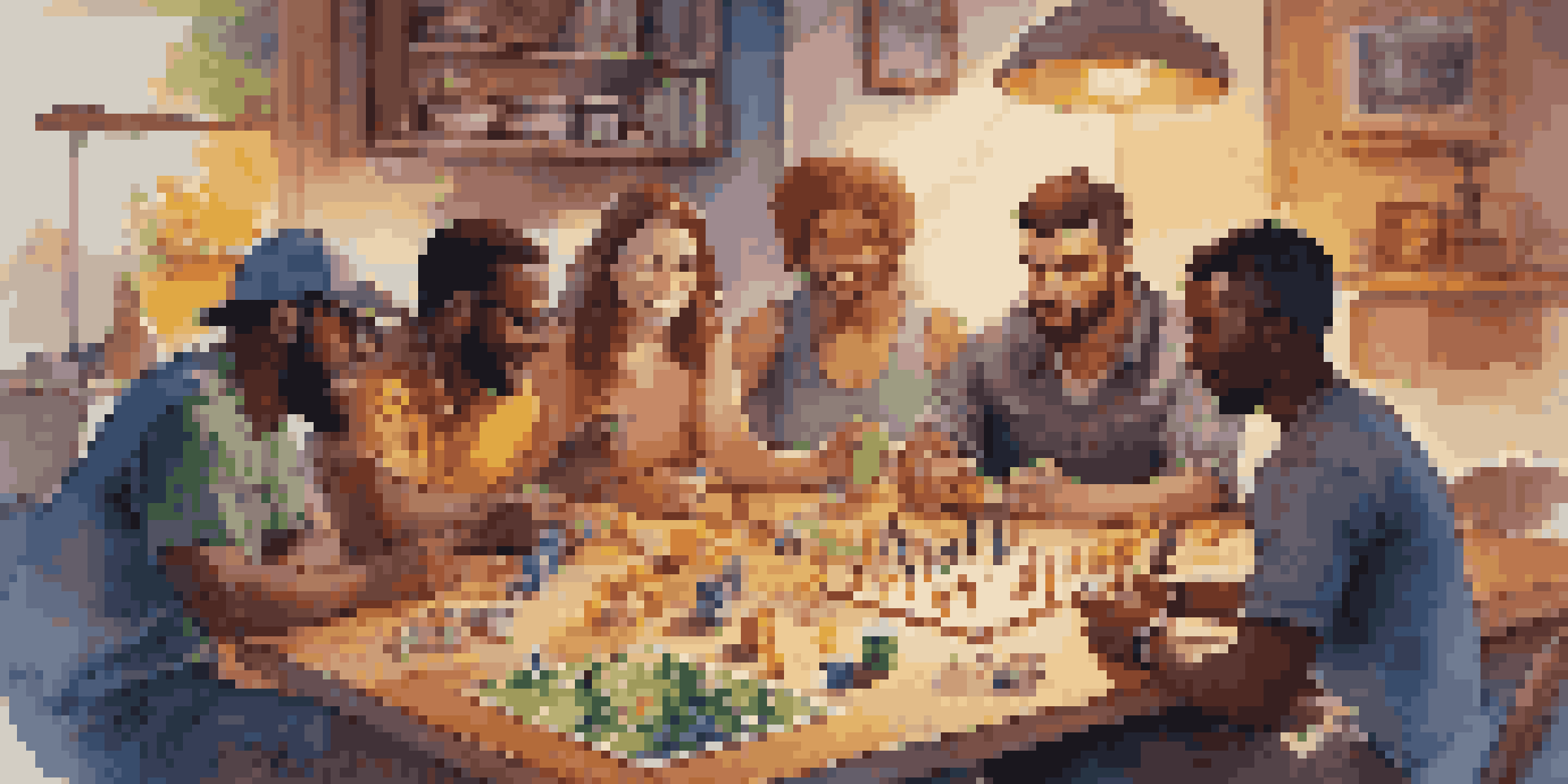The Benefits of Playing Video Games for Skill Development

Enhancing Problem-Solving Skills Through Gaming
Video games often present players with complex challenges that require strategic thinking. For instance, puzzle games like 'Portal' or 'The Witness' demand players to analyze their surroundings and devise solutions creatively. This process of trial and error fosters a mindset that's adept at problem-solving, which is invaluable both in personal and professional life.
Video games are a great way to build critical thinking skills, as they require players to analyze situations and make strategic decisions.
When gamers encounter obstacles, they typically need to adjust their approaches, making quick decisions about what to try next. This adaptability is a crucial skill in today's fast-paced world where change is constant. By navigating intricate game mechanics, players learn to think critically and overcome hurdles efficiently.
Moreover, many games encourage teamwork and collaboration, further enhancing problem-solving abilities. As players work together to achieve common goals, they learn to communicate effectively and share ideas, honing their skills in a collaborative environment.
Boosting Cognitive Skills Through Interactive Gameplay
Engaging with video games can significantly enhance cognitive functions such as memory, attention, and spatial awareness. Fast-paced games, like first-person shooters, require players to track multiple elements simultaneously, sharpening their focus and quick-thinking skills. This heightened cognitive engagement translates well to real-life situations, such as multitasking in a busy workplace.

Research has shown that regular gamers often excel in tasks that require the processing of visual information and quick decision-making. For example, playing strategy games helps develop critical thinking and the ability to foresee potential outcomes. Gamers learn to anticipate their opponents' moves, improving their foresight in various scenarios.
Gaming Boosts Problem-Solving Skills
Video games challenge players to think critically and adapt, enhancing their problem-solving abilities in real life.
Additionally, many video games involve complex narratives that require players to remember characters, storylines, and objectives. This engagement with intricate plots can lead to improved memory retention and recall, skills that are beneficial in academic and professional settings.
Fostering Creativity Through Game Design and Play
Video games serve as a powerful medium for creativity, allowing players to express themselves in unique ways. Games like 'Minecraft' and 'LittleBigPlanet' offer platforms where users can create their worlds and characters, fostering an environment of innovation. This hands-on creativity encourages players to think outside the box and develop their imaginative skills.
Games are the most elevated form of investigation.
Moreover, engaging in game design can further enhance creativity. Many aspiring developers learn to code or design levels, which not only boosts their technical skills but also encourages artistic expression. This blend of creativity and logic nurtures a versatile skill set that is highly valued in many industries today.
Furthermore, players often share their creations with online communities, receiving feedback and inspiration from peers. This collaborative environment not only promotes creativity but also builds a sense of belonging, reinforcing the idea that creative expression can thrive in shared spaces.
Improving Coordination and Motor Skills Through Gaming
Playing video games can significantly improve hand-eye coordination and fine motor skills. Fast-paced action games require precise movements and quick reflexes, helping players refine their coordination over time. This skill is transferable to various real-world tasks, from sports to surgical procedures, where timing and precision are crucial.
Furthermore, games that involve intricate controls, like racing or flight simulators, demand a level of dexterity that enhances motor skills. As players navigate complex terrains or execute stunts, they develop a better understanding of spatial awareness and movement dynamics. This practice can lead to improved performance in physical activities as well.
Cognitive Skills Get a Workout
Interactive gameplay improves memory, attention, and spatial awareness, translating to better multitasking in daily tasks.
In addition, virtual reality (VR) games take coordination training a step further by immersing players in interactive environments. VR gaming enhances the sense of presence, requiring players to physically move and react, thus honing their motor skills in a more engaging way.
Building Resilience and Perseverance Through Challenges
One of the key benefits of video gaming is the development of resilience. Players often face failures and setbacks, whether it's losing a match or failing a level. Learning to cope with these challenges teaches them not to give up easily, fostering a mindset of perseverance that can be applied to real-life situations.
As players work to overcome in-game obstacles, they build confidence in their abilities. This sense of achievement, when they finally conquer a difficult level, translates into a greater willingness to tackle challenges outside of gaming. The ability to bounce back from failures is a crucial life skill that many gamers develop naturally.
Moreover, games that require long-term commitment, such as role-playing games (RPGs), emphasize the importance of dedication. Players invest time and effort to level up their characters, teaching them that progress often requires patience and hard work—a valuable lesson applicable to academic and career pursuits.
Enhancing Social Skills and Teamwork Through Multiplayer Games
Multiplayer video games create opportunities for players to connect and collaborate with others, enhancing their social skills. Games like 'Fortnite' or 'World of Warcraft' require teamwork, as players must communicate and strategize with their teammates to achieve common objectives. This interaction fosters friendships and builds a sense of community.
Furthermore, engaging in online gaming can help individuals develop empathy and understanding. As players encounter diverse characters and narratives, they gain insights into different perspectives, enhancing their emotional intelligence. This ability to relate to others is essential in both personal and professional relationships.
Gaming Enhances Social Connections
Multiplayer games foster teamwork and communication, helping players develop social skills and empathy in diverse settings.
Additionally, the social dynamics of gaming can help shy individuals become more comfortable in group settings. By collaborating in a virtual space, they can practice communication skills and learn to express themselves confidently, which can be beneficial in real-life social interactions.
Developing Time Management Skills Through Gaming
Playing video games often requires players to manage their time effectively, an essential skill in today’s fast-paced world. Many games involve quests or missions that have time constraints, pushing players to prioritize tasks and make quick decisions. This practice can lead to better time management skills in their daily lives.
Moreover, gamers learn to balance their gaming time with other responsibilities, such as schoolwork or jobs. This juggling act promotes discipline and encourages individuals to set goals and deadlines for themselves, ensuring that they can enjoy gaming while also fulfilling their obligations.

Additionally, time management in gaming often involves planning for long-term objectives, such as leveling up a character or completing a complex storyline. This strategic foresight can be applied to real-life projects, helping individuals to break down larger tasks into manageable steps and stay on track.
Cultivating Strategic Thinking and Planning Skills
Many video games require players to think strategically and plan their next moves carefully. Strategy games like 'Civilization' or 'StarCraft' demand that players assess their resources, anticipate opponents' actions, and devise comprehensive plans to succeed. This kind of thinking enhances players' ability to evaluate situations critically and make informed decisions.
As players engage in these strategic scenarios, they also learn to adapt their plans based on changing circumstances. This flexibility in thought is crucial in the real world, where unexpected challenges often arise. The ability to pivot and adjust strategies can lead to success in various aspects of life, from career development to personal projects.
Furthermore, the lessons learned in strategic gaming can extend to teamwork and leadership roles. Players often take on leadership positions within their teams, guiding others in achieving shared goals. This experience equips them with skills that are invaluable in both personal and professional settings.